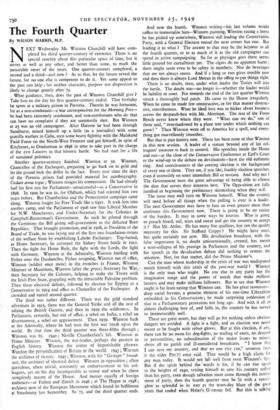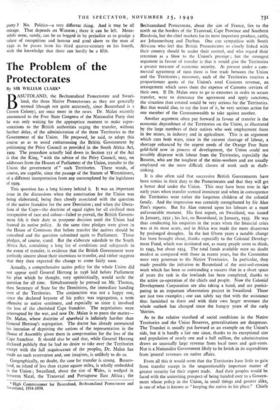The Fourth Quarter
By WILSON HARRIS, M.P.
EXT Wednesday Mr. Winston Churchill will have com- pleted his third quarter-century of existence. There is no special sanctity about this particular space of time, but it serves as well as any other, and better than some, to mark the inexorable onset of the years. One quarter-century completed, a second and a third—and now ? As to that, let the future reveal the Future, for no one else is competent to do it. Yet some appeal to the past can help ; for neither character, purpose nor disposition is likely to change greatly after 75.
What guidance, then, does the past of Winston Churchill give ? Take him on the day his first quarter-century ended. That birthday he spent at a military prison in Pretoria. Therein he was fortunate, for as a non-combatant—a war correspondent for the Morning Post— he had been extremely combatant, and non-combatants who do that can have no complaint if they arc summarily shot. But Winston at 25 was an old campaigner. After Harrow he had been through Sandhurst, mixed himself up a little (as a journalist) with some guerilla warfare in Cuba, seen some heavy fighting with the Malakand Field Force on the North-West Frontier and got himself, in spite of Kitchener, to Onadurman in 1898 in time to take part in the charge of the 2ISt Lancers in that historic battle. No bad start for a life of sustained polemics.
Another quarter-century finished. Winston at 50. Winston, Chancellor of the Exchequer, preparing to go back on to gold and let the pound look the dollar in the face. Every year since the days of the Pretoria prison had provided material for autobiography. Cedant crrata togoe ; Winston resigns his commission. He had already had his first run for Parliament—unsuccessful—as a Conservative in 1898. In 19oo he was in, for Oldham, which had rejected him two years before. But Chamberlain and the Protectionist campaign came along. Winston fought for Free Trade like a tiger. It took him into another camp, and the Parliament of 1906 saw him Liberal Member for N.W. Manchester, and Under-Secretary for the Colonies in Campbell-Bannerman's Government. As such he piloted through the Commons the Bill giving self-government to the defeated Boer Republics. That brought promotion, and in 1908, as President of the Board of Trade, he was laying one of the first two foundation-stones of the welfare State by establishing Labor Exchanges. Top-hatted, as Home Secretary, he surveyed the Sidney Street battle in 1911. Then the fight for Home Rule, the fight with the Lords, the fight with Germany. Winston at the Admiralty, Winston battling with Fisher over the Dardanelles, Fisher resigning, Winston out of office, Winston (soldier once more) in the trenches in France, Winston Minister of Munitions, Winston (after the peace) Secretary for War,- then Secretary for the Colonies, helping to make the Treaty with the Irish Free State, grappling with the intractable Palestine problem. Then three electoral defeats, followed by election for Epping as a Conservative in 1924 and office as Chancellor of the Exchequer. A crowded and varied second quarter.
The third was rather different. There was the gold standard adventure in 1925, there was the General Strike and all the zest of editing the British Gazette, and then in 1929 the wilderness. In Parliament, certainly, but out of office, a rebel on India, a rebel on disarmament, a rebel on appeasement. Then 1939. Winston back at the Admiralty, where he had seen the first war break upon the world. By that time the third quarter was three-fifths through ; Winston was 65. 1940; Neville Chamberlain's fall. Winston as Prime Minister. Winston, the war-leader, perhaps the greatest in English history. Winston the coiner of imperishable phrases. Winston the personification of Britain to the world. 1945 ; Winston the architect of victory. 1945 ; Winston, with his "Gestapo" broad- cast, the architect of electoral defeat. Winston in opposition ; often querulous, often trivial, constantly an embarrassment to his col- leagues, yet on his day incomparable as orator and when he chose completely master of the House. And master equally of foreign audiences—at Fulton and Zurich in 1946; at The Hague in 1948; architect now of the European Movement which found its fulfilment at Strasbourg last September. So 75, and the third quarter ends.
And now the fourth. Winston writing—his last volume would suffice to immortalise him—Winston painting, Winston racing a horse he has picked up somewhere, Winston still leading the Conservative Party, with a General Election round the next corner but one. But leading it to what ? The answer to that may be the keynote to all the fourth quarter, or to as much of it as the old campaigner can spend in active campaigning. So far as physique goes there seems little ground for curtailment yet. The cigars do no apparent harm ; there might seem even to be safety in numbers. Nor do beverages
that are not always cocoa. And if a lung or two gives trouble now and then there is always Lord Moran in the offing to put things right. There is no doubt, then, under what leader the Tories will join the battle. The doubt was—no longer is—whether the leader would
be liability or asset. For towards the end of the last quarter Winston struck a thoroughly bad patch. He came to the House irregularly. When he came he made few constructive, or for that matter destruc- tive, contributions. What he likea best was to bicker about business
across the despatch-box with Mr. Morrison. The rest of the Front Bench never knew where they were. "What can we do," one of
them said, "overshadowed by a plane tree under which nothing can grow?" Then Winston went off to America for a spell, and every- thing got marvellously smoother.
But that is past history now. There has been none of that Winston in this new session. A leader of a stature beyond any of his col- leagues' measure is back in control. His speeches inside the House and out—at the close of the Conservative Conference at Earl's Court or the wind-up to the debate on devaluation—have the old authentic ring. And consciousness of the coming election is the background of every one of them. They are, if you like, frankly election speeches, even if ostensibly on some immediate Bill or motion. And why not ?
The Government have the great advantage of being able to choose the date that serves their interests best. The Opposition are fully justified in beginning the preliminary skirmishing when they will.
The issue may well turn on Winston himself. What the country will need before all things when the polling is over is a leader.
The next Government may have to face an even greater mess than confronts this Government now. There is going to be no easing of the burden. It may in some ways be heavier. Who is going to preach blood, toil, tears and sweat and get the country to accept it ? Not Mr. Attlee. He has many fine qualities, but not the quality necessary for this. Sir Stafford Cripps ? He might have once, but quite certainly not now. His devaluation broadcast, with the false impression it, no doubt unintentionally, created, has meant a semi-collapse of his prestige in Parliament and the country, and his speech in the devaluation debate did nothing to restore the situation. Nor, for that matter, did the Prime Minister's.
Can the man whose leadership in the crisis of war was undisputed match himself with this crisis of the post-war world ? Winston is the only man who might. No one else in any party has the imaginative range and the power of words that make millions hearers and may make millions followers. But to say that Winston
might is far from saying that Winston can. He has great resources—
deep social fervour, a genuine element of his one-time Liberalism embedded in his Conservatism ; he made surprising confession of that in a Parliamentary peroration not long ago. And with it all an almost challenging love of, and faith in, the country he has served so immeasurably well.
These are great assets, but they will go for nothing unless obviou, dangers are avoided. A fight is a fight, and an election was never
meant to be fought with velvet gloves. But at this election, if any, there can be no room for dog-fights, no trailing of coats, no descent to personalities, no subordination Of the major issues to minor. above all no garish and ill-considered broadcasts. "I know thai I can save my country, and that no one else can," someone (was it the elder Pitt ?) once said. That would be a high claim for any man today. It would not fall well from even Winston's tips. But if the spirit behind the words is his, if he can rise again to the heights of 1940, setting himself to save his country rather than his party, even though salvation must come through the instru- ment of party, then the fourth quarter may be lit with a sunset glow as splendid in its way as the noon-day blaze of the great years that ended when Hitler's G-rmany fell. But this is talking
party? No. Politics—a very different thing. And it may be all mirage. That depends on Winston ; there it can be left. Mean- while none, surely, can be so bogged in by prejudice as to grudge a salute of recognition and honour and good cheer to the man of 1940 as he passes from his third quarter-century to his fourth, with the knowledge that there can hardly be a fifth.







































 Previous page
Previous page